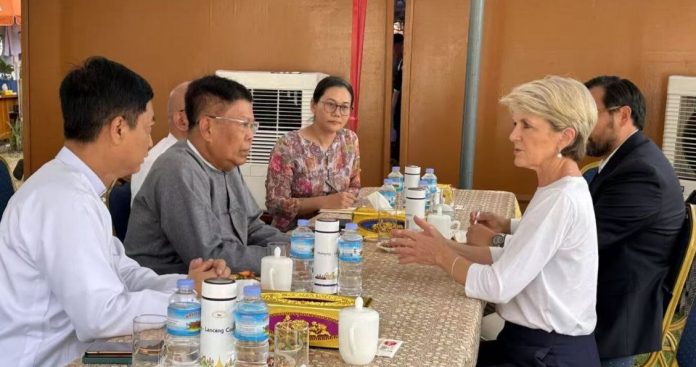Guest contributor
Saw Kapi
Calls for a ceasefire with the military regime in Naypyidaw—especially following natural disasters like the March 28 earthquake—may seem reasonable at first glance, but it actually serves to entrench military control and obstruct the broader struggle for democracy and justice in Myanmar.
When U.N. Special Envoy on Myanmar Julie Bishop urges an end to conflict “so that humanitarian workers and rescue teams can operate,” we must ask: Who will truly benefit from such calls for a ceasefire?
In practice, advocating for a ceasefire under the current conditions bolsters the regime’s strategic aims. It allows the military to regroup, consolidate power, and present itself as a legitimate actor in the eyes of the international community—all while continuing to commit atrocities with impunity.
Since the earthquake, the regime has launched over 150 air and artillery strikes, including a massacre that killed nearly 30 civilians during an attack in the Sagaing Region. These are not signs of a regime seeking peace.
Bishop is at best being disingenuous when she advocates for a ceasefire with the regime. This is the same one that the U.N. condemned for its lethal airstrikes on civilian populations devastated by the earthquake.
The U.N. Human Rights Office spokesperson Ravini Shamdasani said in a statement that since the earthquake: “military forces have reportedly carried out over 120 attacks, and more than half occurred after a declared ceasefire was due to have gone into effect on 2 April. Most attacks involved aerial and artillery strikes, including in areas impacted by the quake. Numerous strikes have been reported in populated areas, with many appearing to amount to indiscriminate attacks and to breach the principle of proportionality in international humanitarian law.”
Let’s be clear: only one side in this conflict has air power, and it is using that capacity to bomb schools, religious sites, and entire communities. This is not a balanced or mutual conflict; it is a terror campaign led by the regime, which calls itself the State Administration Council (SAC).
If Bishop and other international actors genuinely want to help the people of Myanmar, they should call for an immediate end to the regime’s airstrikes and the lifting of international impunity that protects the regime.
Their silence on the air war, while amplifying calls for resistance groups to lay down arms, reveals a skewed understanding of the conflict—and a disregard for the wishes of the people of Myanmar, who overwhelmingly rejected military rule by overwhelmingly voting for a civilian government during the 2020 elections.
International “experts” who continue to pressure resistance forces to accept the regime as a political reality are not offering pragmatic solutions; they are denying the political agency of a population that has risked everything for freedom.
Their polished press statements, crafted to appear balanced and objective, are detached from the brutal realities on the ground. Entire communities in Sagaing and other parts of the country are being erased by air raids, while criminal syndicates and regime-linked businesses continue to operate with protection.
Julie Bishop herself has come under scrutiny for an alleged conflict of interest. On March 9, whistleblower group Justice for Myanmar exposed her business links to Chinese state-affiliated companies through the Australian Securities Exchange-listed ETM, as first reported by The Saturday Paper.
These serious allegations raise questions about her neutrality and whether she is fit to serve as an honest broker in one of the world’s most complex conflicts.
Over 290 civil society organizations have called for a full and transparent investigation by the U.N. Secretary-General. Bishop did deny the allegations, but her denial of wrongdoing does not eliminate the need for accountability.
Accepting the regime as a partner in reconstruction or peacebuilding is not what the people of Myanmar want. It is not what they have voted for, nor is it what they have risked their lives for.
Unless international engagement is grounded in the lived realities of those resisting dictatorship—and unless it demands an end to the regime’s most devastating tactics, including airstrikes—then the cycle of violence will continue, and peace will remain an illusory dream.
Saw Kapi is the founding director of the School of Governance and Public Administration (www.sgpa.info).
DVB publishes a diversity of opinions that does not reflect DVB editorial policy. We’d like to hear what you think about this or any of our stories: [email protected]



